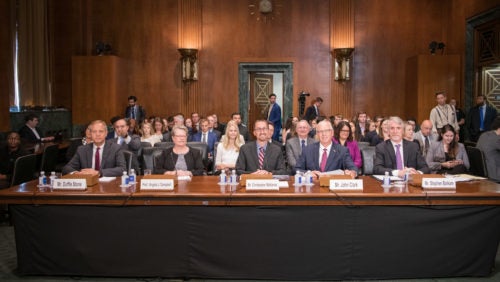On the Hill: Professor Angela Campbell on Protecting Children’s Privacy in the Digital Age
July 10, 2019

On July 9, Professor Angela Campbell (second from left), who directs the Institute for Public Representation’s Communications & Technology Law Clinic, testified before the Senate Committee on the Judiciary in a hearing on “Protecting Innocence in a Digital World." (Photo Courtesy U.S. Senate)
On July 9, Professor Angela Campbell, who directs the Institute for Public Representation’s Communications & Technology Law Clinic, testified before the Senate Committee on the Judiciary in a hearing on “Protecting Innocence in a Digital World, chaired by Senator Lindsey Graham (R-SC).
In her oral and written testimony, Campbell told the committee of recent work of the clinic 1) asking the FTC to investigate whether the Google Play Store was engaging in unfair and deceptive practices in marketing apps for children and 2) whether YouTube was violating privacy law with respect to children.
On behalf of clients, Campbell and the Georgetown Law clinic have filed 14 requests since 2012 asking the FTC to investigate violations of the Children’s Online Privacy Protection Act (COPPA). But the FTC has not acted, at least publicly, in response to any of these requests, Campbell said.
“So many of the problems that families are struggling with today — such as how to protect their children’s privacy, how to prevent exposure to inappropriate content and to limit the amount of time children are spending online on digital devices — are the direct result of two things,” Campbell said. “First, the business models of the dominant tech companies [are designed not] to protect children or nurture children, but to attract [a] large number of users, including children, and to keep them online as long as possible, so they can maximize revenue by collecting valuable data about the users and delivering targeted marketing to them.
“Second…the government has failed to adopt sufficient safeguards for children and has not effectively enforced the safeguards that do exist,” Campbell said, noting that the Federal Trade Commission has failed to vigorously enforce the Children’s Online Privacy Protection Act, and that as a result, the big tech companies — including Google, YouTube, Facebook, and Amazon — feel empowered to ignore the existing safeguards.
Solutions
In her oral and written testimony, Campbell — who is also the faculty director of Georgetown Law’s Institute for Technology Law & Policy — called for updated legislation, since COPPA was adopted in 1998 when there was no social media, YouTube, smartphones or toys connected to the Internet. “COPPA has not kept up with these new developments…” she said. “Passing the Do Not Track Kids Act of 2019, introduced by Senators [Ed] Markey (D-Mass.) and [Josh] Hawley (R-Mo.), would be a good first step.”
She also called for the FTC to enforce the law more effectively (responding to a question on how she would grade the agency from one to 10, Campbell replied, “one half”) and to ensure that the law’s self-regulatory safe harbor programs designed to augment FTC protection “are actually doing their job.”
Since 2000, the FTC has only brought 29 actions to enforce COPPA; Campbell therefore urged the committee to put pressure on the agency to enforce current laws and to get tech companies to act more responsibly.
“Given the large number of web sites and online services used by children…it’s not easy for the FTC to pursue all violations,” Campbell said. “For this reason, I urge the FTC [to] use its authority…to hold platforms responsible when they characterize apps or other content as appropriate for children when they are not, and conversely, when they say their services are not appropriate for children, and yet they know that a lot of children are using them[.]”